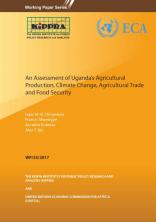WP25 Scoping study Uganda

Research in the recent past has demonstrated that climate change has potential impact on the climate and ecosystems globally, whose resultant efects are enormous on habitants (IPCC, 2007). Accordingly to IPCC (2012), evidence exists from observations gathered since 1950 of some extreme changes in climate. Some of the extremes have changed as a result of anthropogenic inluences, including increases in atmospheric concentrations of greenhouse gases. Economic losses from weather and climate-related disasters have increased, although with large spatial and inter-annual variability. Estimates of annual losses have increased from a few US$ billion in 1980 to above US$ 200 billion in 2010, with the highest value for 2005 (the year of Hurricane Katrina). Therefore, future changes in exposure, vulnerability, and climate extremes resulting from natural climate variability, anthropogenic climate change, and socioeconomic development has potential to alter the impact of climate extremes on natural and human systems.
It is now a fact that changes in precipitation, length of growing seasons, water availability, carbon uptake, incidences of extreme weather events, changes in lood risks, desertiication, distribution and prevalence of human diseases and plant pests has greatly impacted on food security/agriculture and thus signiicantly altering conditions for agricultural production especially in Africa. Barrios et al. (2008) and Lotsch (2007), among others, have modeled the impact of climate change on agricultural production in Africa, which illustrates that there will be negative efects on crop yields and livestock management over the next century by up to 50 per cent in 2020. These impacts are likely to be severe on food security especially in Africa ,and the EAC region is not an exception. Uganda like other EAC countries will continue to experience increasing climate variability, declining food production and hunger and thus limit the country’s ability to attain food security due to the unfavorable positioning in regional trade.